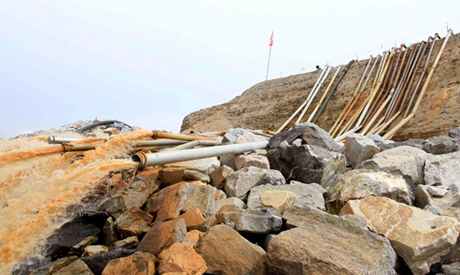
File photo: Water gushes out from pipes by the construction of Ethiopia's Great Renaissance Dam in Guba Woreda, some 40 km (25 miles) from Ethiopia's border with Sudan, June 28, 2013 (Photo: Reuters)
Egyptian Prime Minister Hazem El-Beblawi has stated that the negotiations with Ethiopia over its major hydroelectric dam project, the Grand Renaissance Dam, have not finished, despite recent deadlock.
"No negotiations or talks end in just one session, but some matters are stuck in the middle of those talks," the premier told journalists on Thursday regarding the ongoing negotiations between Egypt, Sudan and Ethiopia about the dam.
Egypt and Ethiopia have been at loggerheads over the project on the Blue Nile, a key tributary of the Nile, since 2013, when footage of the construction process was aired on Egyptian television. The Egyptian government believes that the project could affect the amount of water reaching Egypt, which relies on Nile for the vast majority of its potable water. Ethiopia maintains that Egypt's water share will not be negatively affected by the successful completion of the project.
"It is untrue that the Renaissance Dam has become a reality we have to deal with," El-Beblawi said, adding that the project was facing financial and other technical problems.
El-Beblawi’s statements come after similar comments on Wednesday by an Egyptian irrigation ministry official, Khaled Waseef, who also stated that the Ethiopian dam was facing financial and technical problems. According to Waseef, Ethiopian government claims that 30 percent of the dam have been completed are a “media show.”
Egypt, Ethiopia and Sudan have formed a tripartite technical committee to study the possible effects of the dam and try to generate consensus.
In recent meetings in Khartoum, the tripartite committee was scheduled to formulate a document that entails "confidence building measures" between the countries, and also to form a special international conflict-resolution committee. Both plans failed as Egypt and Ethiopia refused to see eye-to-eye.
Short link: